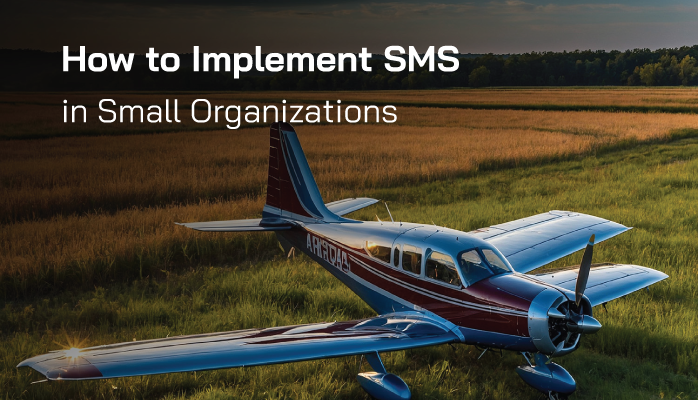
SMS Software Cost vs. Value Analysis
For small fixed-base operators (FBOs), charter operators, UAS, MROs, and airports, managing safety has become a non-negotiable priority. With increasing regulatory demands from the Federal Aviation Administration (FAA) and the International Civil Aviation Organization (ICAO), Safety Management Systems (SMS) are no longer optional—they’re essential. But for small operators with limited budgets and lean teams, the question remains: Is investing in SMS software for small aviation operators worth it compared to sticking with manual processes?
This article dives into the costs, value, and return on investment (ROI) of adopting SMS software, using tools like SMS Pro as a benchmark.
The Hidden Costs of Manual SMS Processes
Many small aviation operators rely on manual methods—spreadsheets, paper forms, or basic email systems—to manage their SMS requirements. While these methods seem cost-effective at first glance, they come with hidden expenses that can quickly outweigh the price of dedicated software.
1. Time-Intensive Workflows
Manual SMS processes are labor-intensive. Compiling incident reports, conducting risk assessments, and preparing for audits often require hours of repetitive work. For example, a small FBO might spend 20 hours per week on SMS-related tasks, such as logging hazards or updating compliance records. At an average labor cost of $30 per hour, that’s $600 weekly—or $31,200 annually—spent on tasks that could be automated.
2. Human Error Risks
Manual data entry is prone to errors. A misplaced decimal in a risk assessment or an overlooked hazard report can lead to safety oversights, potentially resulting in incidents. The cost of an error isn’t just operational—it’s reputational. A single safety lapse can erode customer trust, especially for charter operators competing in a tight market.
3. Non-Compliance Penalties
The FAA and ICAO have strict SMS mandates, particularly for operators under FAA Part 139 for small airports and Part 135 for charter operations. Non-compliance can lead to hefty fines, ranging from $13,066 to $97,500 per violation, depending on severity. Additionally, failing an audit can result in operational restrictions or loss of certification, which can cripple a small operator’s business.
4. Reputational Damage
In the aviation industry, reputation is everything. A safety incident tied to inadequate SMS processes can lead to negative publicity, loss of clients, and difficulty attracting new business. For small FBOs and charter operators, where word-of-mouth and local relationships drive revenue, the stakes are even higher.
Case Study: A small FBO in Texas relied on manual SMS processes, spending 25 hours weekly on audits and reporting. After a near-miss incident due to a misfiled hazard report, they faced an FAA audit. The resulting $15,000 fine and temporary operational restrictions cost them $50,000 in lost revenue. Switching to SMS software could have prevented this.
The Value of SMS Software for Small Aviation Operators
SMS software, like SMS Pro, offers a streamlined, scalable solution designed to meet FAA and ICAO compliance requirements. Priced at approximately $300 per month for small operators, it’s an investment that delivers significant value in time savings, error reduction, and operational efficiency. Here’s why it’s worth it.
1. Time Savings
SMS software automates repetitive tasks, such as hazard reporting, risk assessments, and audit preparation. For example, SMS Pro’s web-based platform allows employees to submit safety reports in real-time, which are automatically logged and categorized. This eliminates hours of manual data entry. A small FBO using SMS Pro reported saving 20 hours weekly on audits and reporting, translating to $31,200 in annual labor cost savings.
2. Error Reduction
Automated systems minimize human error. SMS Pro includes features like pre-built templates for risk assessments and compliance checklists aligned with FAA Part 139, Part 5, EASA and ICAO Annex 19 standards. These tools ensure consistency and accuracy, reducing the likelihood of oversights that could lead to safety incidents or audit failures.
3. Scalability
Small operators often plan for growth, whether expanding services or adding aircraft. Manual processes struggle to scale, requiring more staff and time as operations grow. SMS software is designed to scale effortlessly, handling increased data and complexity without additional labor. SMS Pro, for instance, supports multiple users, locations and business units, integrating complex operations with a mixture of FBOs, MROs, Flight School and Charter Ops, making it ideal for operators eyeing expansion.
4. Enhanced Safety Culture
SMS software fosters a proactive safety culture by making reporting accessible and transparent. Employees can submit hazards via mobile devices, and managers can track trends through dashboards. This encourages accountability and continuous improvement, aligning with ICAO’s emphasis on safety performance management.
5. Audit Readiness
FAA, EASA and ICAO audits are rigorous, requiring detailed documentation and evidence of compliance. SMS software centralizes all SMS data, making it easy to generate reports and demonstrate compliance. SMS Pro’s audit tools have helped operators pass FAA Part 139 inspections and IATA audits with zero findings, saving time and avoiding penalties.
Case Study: A Part 135 charter operator adopted SMS Pro for $300/month. Previously, they spent 15 hours weekly on manual SMS tasks. After implementation, they reduced this to 3 hours, saving $14,400 annually. The software also helped them pass an FAA audit, avoiding a potential $20,000 fine.
Cost vs. Value: Breaking Down SMS Pro’s Pricing
At $300 per month, or $3,600 annually, SMS Pro is a cost-effective solution for small operators. Let’s compare this to the costs of manual processes and non-compliance:
- Manual Process Costs: 20 hours/week at $30/hour = $31,200/year.
- Non-Compliance Fines: $13,066–$97,500 per violation.
- Reputational Damage: Potentially $50,000+ in lost revenue.
- SMS Pro Cost: $3,600/year.
The savings from time efficiency alone ($31,200 - $3,600 = $27,600) justify the investment. Add in the avoided fines and reputational risks, and the value becomes undeniable.
ROI Calculation for Small Operators
To quantify the return on investment (ROI) of SMS software, consider the following example for a small FBO:
- Investment: SMS Pro at $3,600/year.
- Savings:
- Time Savings: 20 hours/week x $30/hour x 52 weeks = $31,200.
- Avoided Fines: $15,000 (conservative estimate based on one minor violation).
- Total Savings: $31,200 + $15,000 = $46,200.
- ROI Formula: [(Savings - Investment) / Investment] x 100 = [($46,200 - $3,600) / $3,600] x 100 = 1,183%.
An ROI of 1,183% means that for every dollar spent on SMS Pro, the FBO gains $11.83 in value. This doesn’t even account for intangibles like improved safety culture or customer trust.
Addressing Common Concerns
Small operators often hesitate to adopt SMS software due to concerns about cost, complexity, or training. Here’s how SMS Pro addresses these:
- Cost: At $300/month, it’s affordable for small budgets, with no hidden fees.
- Complexity: SMS Pro’s user-friendly interface requires minimal training with embedded training videos. SMS Administrator support is included.
- Training: Online tutorials and customer support ensure quick onboarding, even for non-tech-savvy teams.
Why SMS Software Is a Must for FAA and ICAO Compliance
The FAA’s 2024 SMS rule expansions mandate SMS for Part 135 operators, Part 21 manufacturers, and Part 91.147 air tour operators, with deadlines approaching by May 2027. FAA Part 139 for small airports also requires SMS for certificated airports, aligning with ICAO Annex 19 standards. Manual processes are increasingly unsustainable under these regulations, as they lack the robustness and scalability needed for compliance.
SMS software ensures operators meet these requirements efficiently. SMS Pro, for example, is designed to comply with ICAO Annex 19 and FAA Part 5, offering tools like hazard reporting, risk management, and compliance monitoring. This not only satisfies regulators but also enhances safety, making operators more attractive to insurers and clients.
Conclusion: Invest in Safety, Invest in Success
For small FBOs, charter operators, UAS, MROs, and airports, the choice is clear: SMS software for small aviation operators is a smart investment. The costs of manual processes—time, errors, fines, and reputational damage—far outweigh the $300/month price of tools like SMS Pro. With proven time savings, error reduction, scalability, and an ROI of over 1,000%, SMS software delivers unmatched value.
Don’t let manual processes hold your operation back. Embrace SMS software to ensure compliance, enhance safety, and position your business for growth. Ready to make the switch? Explore SMS Pro Today.





